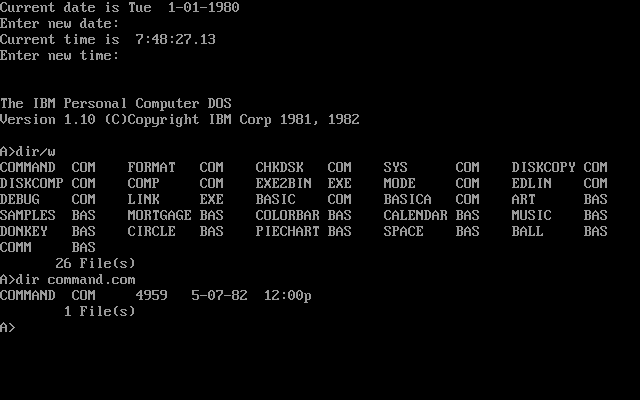Microsoft puts MS-DOS up on GitHub (for reference purposes only)
Microsoft makes the 37-year-old operating system open source (again)


You can't keep a good operating system down. Although it's been 18 years since the text-entry OS was officially retired, Microsoft has made MS-DOS publicly available on its recent acquisition GitHub.
Previously, the source code had been released on the Computer History Museum, but four years later it's now mirrored on GitHub.
"Why? Because it's much easier to find, read, and refer to MS-DOS source files if they're in a GitHub repo than in the original downloadable compressed archive file," explains Rich Turner, Senior Program Manager on the Microsoft blog.
Obviously, this isn't a re-release intended to replace Windows 10 on your company network. Rather, MS-DOS 1.25 and 2.0 are available by parties interested in examining how the veteran operating system behaves. As such, the source files are intended purely for reference, and Microsoft understandably isn't allowing pull requests or modifications on GitHub.
Version 1.25 which consists of just seven assembly source files first emerged in May 1983. Version 2.0 followed three months later in August, and offers much more sophistication, consisting of 100 source files.
You'll find a reference to this (relatively) unwieldy size within the source notes: "COMMAND.ASM is currently too large to assemble on a micro." It added some useful features though, including support for 180 and 360-kilobyte floppy-disk drives.
MS-DOS would go on to graduate all the way up to version 8.0 before it finally outstayed its mainstream usefulness in 2000, when it ceased to be part of the shiny, new Windows XP software.
Sign up today and you will receive a free copy of our Future Focus 2025 report - the leading guidance on AI, cybersecurity and other IT challenges as per 700+ senior executives
Eighteen years later, it's available purely as a curiosity, rather than to improve productivity, but Turner is confident that people will enjoy the trip down (32kb) Memory Lane. "Enjoy exploring the initial foundations of a family of operating systems that helped fuel the explosion of computer technology that we all rely upon for so much of our modern lives," he writes.
Image: Wikipedia
After a false career start producing flash games, Alan Martin has been writing about phones, wearables and internet culture for over a decade with bylines all over the web and print.
Previously Deputy Editor of Alphr, he turned freelance in 2018 and his words can now be found all over the web, on the likes of Tom's Guide, The i, TechRadar, NME, Gizmodo, Coach, T3, The New Statesman and ShortList, as well as in the odd magazine and newspaper.
He's rarely seen not wearing at least one smartwatch, can talk your ear off about political biographies, and is a long-suffering fan of Derby County FC (which, on balance, he'd rather not talk about). He lives in London, right at the bottom of the Northern Line, long after you think it ends.
You can find Alan tweeting at @alan_p_martin, or email him at mralanpmartin@gmail.com.
-
 Will autonomous robotics leap forward in 2026?
Will autonomous robotics leap forward in 2026?In-depth Connectivity and cost benefits remain barriers, despite breakthroughs in physical AI
-
 AWS and NTT Data team up to drive legacy IT modernization in Europe
AWS and NTT Data team up to drive legacy IT modernization in EuropeNews Partnership between AWS and NTT DATA aims to boost AWS European Sovereign Cloud capabilities
